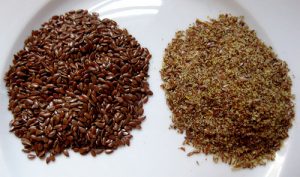You’ve probably heard of flaxseed and wondered what benefits you can derive from it. Dry, itchy skin? Acne? Redness? Eczema? If you are experiencing these conditions, you are most likely deficient in omega-3 fatty acids.
Fish or fish oil are the best sources of omega-3 fatty acids. Unfortunately, not everyone can eat fish nor take fish oil supplements. These people do not have any choice but to turn into plant-based sources—specifically, Flaxseed.
Take Your Flaxseed
Flaxseed has the highest dose among all the plant-based omega-3’s and is very rich in alpha-linoleic acid, one of the essential fatty acids that can only be obtained from one’s diet. It is also the richest dietary source of lignans which have the ability to bind with estrogen and flush excess amounts of such from the body, thus reducing the risk of menopausal symptoms like hot flashes and night sweats.
More notably, lignans have shown anti-inflammatory and antioxidant activities which may reduce the risk of breast cancer. This anti-inflammatory ability can quicken wound healing, and and the omega-3 ingredient keeps the skin well-hydrated and moisturized. Research has recorded diminished skin redness, reduced blood flow, and increased skin hydration after 12 weeks of intake.
Incorporating Flaxseed In Your Diet
Flaxseed flour can be used in baking, while flaxseed oil can be added to everyday dishes like rice, salad, and vegetables. Start off with 2 tablespoons on your smoothie, and add 1 tablespoon of flaxseed oil on your lunch or dinner. Flaxseed meal and oil have a refreshing, nutty taste. Your body will surely benefit from this, considering that in every 2 tablespoons of flaxseed meal, you can get 3 grams of protein and 4 grams of fiber.
A word of caution though: you should never use flaxseed oil in cooking since its high fatty acid content makes it highly susceptible to damage even on low heat. Keep it in a dark bottle and refrigerated.

